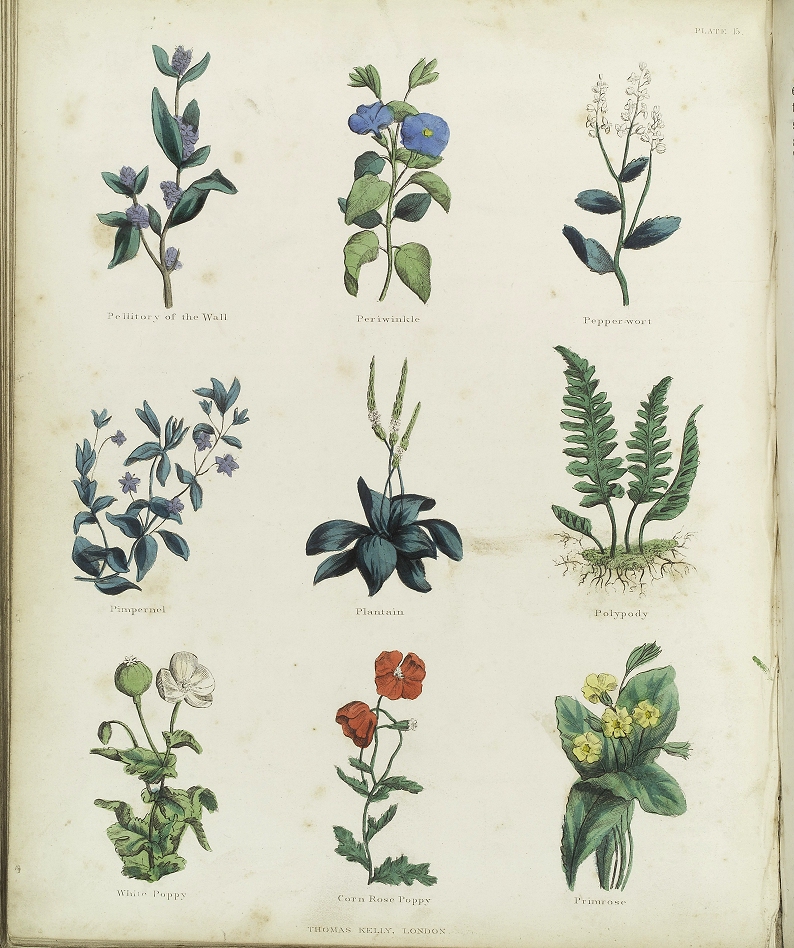- Oregano
- Used as a digestive aid, arthritis treatment, expectorant for cough, colds and chest congestion.
- Parsley
- Galen prescribed parsley for epilepsy and as a diuretic to treat water retention. Hildegard of Bingen recommended parsley compresses for arthritis and parsley boiled in wine for chest and heart pain.
- Pennyroyal (Fleabane)
- Pliny first discovered that when rubbed on the skin or strewn, pennyroyal repelled fleas. He also recommended it as a cough remedy and digestive aid. Taken with honey, pennyroyal was said to cleanse the lungs and clear the chest of "all gross and thick humors".
- Roses
- Hippocrates recommended rose flowers mixed with oil for diseases of the uterus. Hildegard of Bingen prescribed rose hip tea as the initial treatment for many complaints including headache, dizziness and cramps. For difficulty in swallowing, Gilbertus Anglicus recommended a syrup called "honey roset" which consisted of a pound of minced roses soaked in a pound of honey over a fire.
- Rosemary
- In 1235 Queen Elizabeth of Hungary became paralyzed. According to legend, a hermit soaked a pound of rosemary in a gallon of wine for several days then rubbed it on her limbs, curing her. Rosemary/wine combinations became known as Queen of Hungary's Water and were used externally to treat skin problems, gout, dandruff, and prevention of baldness.
- Saffron
- Rare in Europe until after the Crusades, by the 14th century saffron was recommended to treat jaundice, insomnia and cancer.
- Sage
- Sage was considered to be something of a cure-all. Pliny prescribed it for snakebite, epilepsy, intestinal worms and chest ailments. Dioscorides recommended using sage leaves as bandages for wounds. Gilbertus Anglicus recommends the following for aching eyes:
And if it (the ache of the eyes) comes of phlegm purge it as I told in the headache and in other sicknesses of the head. And if it be of melancholy, purge it. And afterward let him be stood over a stew five or seven times, that is made of wormwood, betony, fennel, sage, flowers of thyme, chamomile flowers, melilot flowers, hock, and wild celery. All these must be soaked in wine and water together, half wine and the other half water. And let him hold his eyes and his head over the stew. And afterward take a linen cloth or cotton and wet in the water. And anoint therewith his eyes.
- St. John's Wort
- Early physicians prescribed St. John's Wort taken internally with wine as a cure for poisonous snakebite and externally as a treatment for burns. Christians believed that St. John's wort repelled evil spirits and burned it in bonfires on St. John's Eve to purify the air, drive away evil spirits and ensure healthy crops.
- Thyme
- Thyme was used as a cough remedy, digestive aid and treatment for intestinal worms. Hildegard of Bingen favored it for skin problems. Thyme was also recommended to those who suffered from depression; they were advised to sleep on thyme-stuffed pillows. Gilbertus Anglicus recommended the following involved treatment for a soft spleen:
For softness of the spleen, if it be of cold humors give him oximel (medicine made of two parts vinegar and one of honey) to defy the humors. Afterward give him iera pigra Galieni (a decoction made of valerian, cinnamon, saffron, camel hay, hazelwort, bark of cassia and balsa, violets, wormwood, roses, gourds and aloes among other spices) to purge the humors. After the third day treat with a bath of hot herbs such as oregano, mint, horehound, thyme, rosemary and such others. And the next day let him bleed under the ankle in the underside of the left foot. And make him hot plasters of rue, celandine, and nettles to consume the humors and lay to the spleen.
- Valerian
- Ancient physicians recommended valerian as a diuretic, antidote to poisons, for pain relief and as a decongestant. Hildegard of Bingen prescribed it as a tranquilizer and sleeping aid.
- Vervain
- In the middle ages healing herbs were called simples. Vervain was prescribed so often and for so many different ailments that it became known as "simpler's joy." It was recommended for fever, tumors, blood infections, toothache, and acne among many other ailments.
- Yarrow
- Used to treat inflammations, to stop bleeding, as a digestive aid, for pain relief and as a mild sedative.
Photo credits: (Related Resources) (1) Sage, Otto Wilhelm Thome, Flora von Deutschland, Germany, 1885, PD-ART, Wikimedia Commons, (2) Plants and herbs from Culpeper's The Complete Herbal, Wellcome Library on Wikimedia Commons, Creative Commons CC BY 4.0

